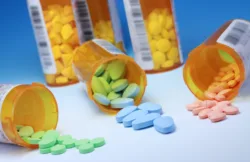Addiction Among Adolescents: Effective Interventions for Parents of Addicted Teens

Unfortunately, there is not an easy answer for why teens turn to addictive substances, but knowing and understanding more about addiction and addiction among adolescents can help parents and other adult figures provide support to the teens in their lives.
One common question is, “How can a person suffering from addiction get help?” While there is not a definitive answer, there are some great interventions that are proven to be effective in treating addiction among adolescents.
Contingency Management
Although a parent’s first instinct may be to punish a teen for risky behaviors, “adolescents are shown to respond more to rewards than punishments.” (1) Contingency management, or the reward system, has been tested and proven to be effective.
When you recognize, compliment, or reward your teen for a positive behavior, it’s likely to act as more of a deterrent to negative behavior than just punishing poor conduct as it happens. A healthy balance between consequences or punishment and rewards is necessary.
General Knowledge of Teen Cognitive Development
Learning more about the teen brain can also help adults understand and prevent addiction in adolescents. Almost all teens experience a developmental stage of idealism during their growth, meaning they may construct an idealistic picture of a world with no bias, favoritism or distasteful, offensive conduct existing in it. This often comes quickly to an end because of the cruel realities of life and may often cause an opposite, negative view of the world. Couple this idealistic view with poor rational thinking skills and the result will often be a large distortion of healthy decision-making.
Compromise on Both Sides
Teens also often desire to replicate the success of their parents (house, car, lucrative job), but often do not want to put the work and time in to accomplish these goals. Parents, however, desire for their teens to think, act and make decisions the way that they do without putting in much work. Meeting in the middle, listening to perspectives and not just offering them and a willingness to compromise on both sides can drastically improve familial relationships.
Understanding a teenager’s thought process and perspectives and learning about proven addiction interventions can be helpful in handling and potentially preventing addiction among adolescents.
Resources:
- https://us.sagepub.com/en-us/nam/counseling-individuals-through-the-lifespan/book237730%20
Unfortunately, there is not an easy answer for why teens turn to addictive substances, but knowing and understanding more about addiction and addiction among adolescents can help parents and other adult figures provide support to the teens in their lives.
One common question is, “How can a person suffering from addiction get help?” While there is not a definitive answer, there are some great interventions that are proven to be effective in treating addiction among adolescents.
Contingency Management
Although a parent’s first instinct may be to punish a teen for risky behaviors, “adolescents are shown to respond more to rewards than punishments.” (1) Contingency management, or the reward system, has been tested and proven to be effective.
When you recognize, compliment, or reward your teen for a positive behavior, it’s likely to act as more of a deterrent to negative behavior than just punishing poor conduct as it happens. A healthy balance between consequences or punishment and rewards is necessary.
General Knowledge of Teen Cognitive Development
Learning more about the teen brain can also help adults understand and prevent addiction in adolescents. Almost all teens experience a developmental stage of idealism during their growth, meaning they may construct an idealistic picture of a world with no bias, favoritism or distasteful, offensive conduct existing in it. This often comes quickly to an end because of the cruel realities of life and may often cause an opposite, negative view of the world. Couple this idealistic view with poor rational thinking skills and the result will often be a large distortion of healthy decision-making.
Compromise on Both Sides
Teens also often desire to replicate the success of their parents (house, car, lucrative job), but often do not want to put the work and time in to accomplish these goals. Parents, however, desire for their teens to think, act and make decisions the way that they do without putting in much work. Meeting in the middle, listening to perspectives and not just offering them and a willingness to compromise on both sides can drastically improve familial relationships.
Understanding a teenager’s thought process and perspectives and learning about proven addiction interventions can be helpful in handling and potentially preventing addiction among adolescents.
Resources:
- https://us.sagepub.com/en-us/nam/counseling-individuals-through-the-lifespan/book237730%20







